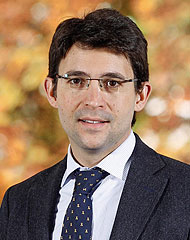Self-awareness, emotional balance and integrity, among the 12 competences core topic for the student development
The book Tu&Co, mentoring universitario compiles 60 years of the University's experience in university mentoring.

What can teachers do to help their students develop their potential? Through mentoring, we want to work on the ability to know the particular reality of each student to help, stimulate and propose new challenges that will help them grow during their time at university. With this in mind goal, the University of Navarra has published the book Tu&Co, mentoring universitario, a project that brings together more than 60 years of experience in mentoring with new guidelines from work.
"The aim of the Tu&Co program is to improve mentoring at the University. Compiling the experience of many years, we have designed a methodology with phases, tools and resources to facilitate the mentors' work with the students", said Álvaro Lleó, professor of Personnel Management Service at Tecnun-Escuela de Ingeniería of the University of Navarra, one of the promoters of project and co-author of the book, published by Eunsa- Ediciones Universidad de Navarra.
Tu&Co is presented as a programme based on the development of competences. A project that aims to help students get to know themselves better in order to become better people and professionals.
The book compiles the materials that make up the Tu&Co methodology: it describes 12 competences core topic for a student's development such as communication, social skills, work in a team, the capacity for management conflict management, initiative, optimism, management of time, self-knowledge, decision-making, capacity for effort, emotional balance and integrity. It includes an interview plan, questionnaires, a notebook of work with exercises to analyse the results, guides with ideas to develop each of the competences and finally, two cases based on real experiences.
Experience of more than 50 teachers and 150 studentsThe competences have been validated by companies employing students from the University. For each of them, characteristic behaviours and examples are detailed with concrete manifestations that show what needs to be improved, questions to provoke reflection and concrete suggestions for improvement. In addition, the guides compile the experiences of more than 50 teachers and almost 150 students. Finally, books, articles, videos, films and tools to help students are also recommended.
The University's IT Services department has developed IT tools to automate the assessment and diagnosis of competences and a portal web site with all the programme information. "I think the best of Tu&Co is yet to come. Now that the methodology is defined, we can continuously improve it. As the programme becomes more widely used, we will gather new ideas and best practices to further improve mentoring with our mentees," Lleó added.





